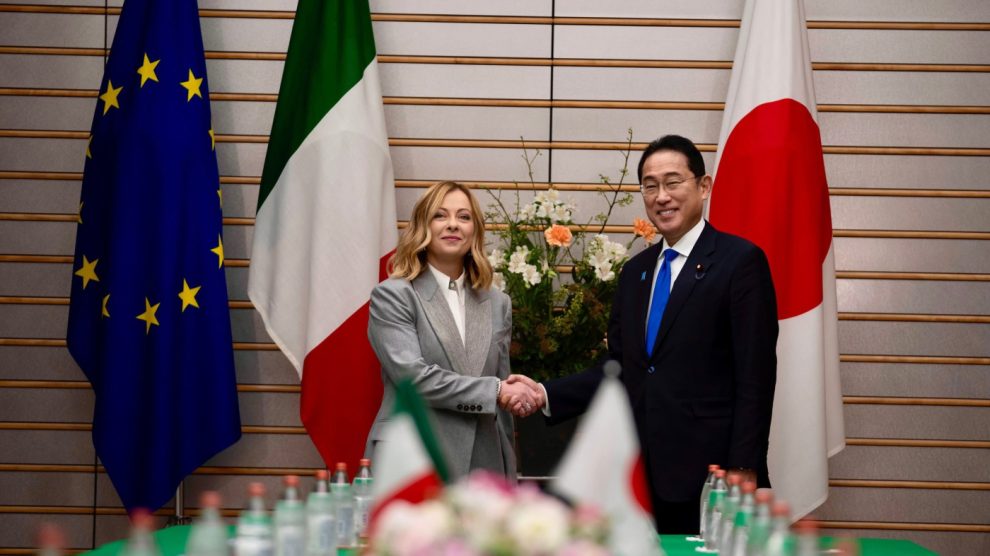Rome and Tokyo keep getting closer. On Monday, Italian Prime Minister Giorgia Meloni was in the Japanese capital for a series of high-level meetings, starting with her counterpart Fumio Kishida. The two had met several times in 2023, the year Japan and Italy upgraded their relationship to a “strategic partnership,” worked together within the G-7, oversaw joint military training, launched the project to build the next-gen fighter jet (along with London) and intensified industrial cooperation.
Material cooperation. During a joint press conference with PM Kishida, PM Meloni rejoiced for the “relaunch” of the “political and strategic collaboration with Japan.” She said that a new bilateral consultation mechanism on security and defence will begin in March (at a time of intensifying Japan-NATO ties) and anticipated “important joint military exercises, because Italy “intends to have an increasingly significant presence in the Indo-Pacific.”
- Italy’s flagship aircraft carrier Cavour, the Navy’s Vespucci training ship – an emblem of Italy’s soft power – and a fleet of its F-35s are all en route to Japan, she recalled.
Frontier tech, defence, trade. Italy-Japan bilateral agreements are entering into force, promoting people-to-people contacts and setting the stage for enhanced cooperation across sectors. Nowhere is that more evident than with the Global Combat Air Programme, officially established in December between London, Rome and Tokyo. PM Meloni vowed to support the project, which aims to build the sixth-generation fighter jet, an effort that will bridge the three nations’ defence and industrial ecosystem.
- In December, Italy and Japan also struck an industry-heavy deal to deepen economic, industrial and technological cooperation and foster mutual investments. These cover areas like semiconductors, aerospace and materials, biotech, and communications.
It’s (geo)political. PM Meloni told the Japanese paper Yomiuri Shimbun that the bilateral entente “is expanding on all fronts,” hailing “the strengthening of industrial partnerships, especially in high-tech sectors, and the implementation of joint scientific research projects.” She described her visit as an “important opportunity” for deep talks with PM Kishida. Especially because Italy just took over from Japan, “in continuity with the impressive work [Tokyo] carried out in 2023.”
- This is the first visit on the Italian PM’s tour to touch base with the other G-7 leaders.
- “In the current geopolitical context, marked by multiple crises and attacks on the rules-based international order, it is crucial for allied and like-minded nations like ours to work together on major global issues,” said the Italian PM in the interview.
Eastern longitudes, Western vibes. She reiterated that Italy’s support to Ukraine remains “unwavering” and will remain at the “heart” of the Italian G-7 presidency, “in continuity with the great attention also given by the Japanese Presidency in 2023.” The greatest weapon democracies have at their disposal is “the unity of our action,” she argued, stressing Rome’s efforts to mitigate the impact of the war by focussing on food security and the resilience of value chains.
- She then recalled her actions to bring about Italy’s exit from China’s Belt and Road Initiative, partly because it had “not created the hoped-for benefits,” and redirect the collaboration with Beijing “towards more specific and suitable instruments […] without the broad strategic sharing that membership of the BRI entails.”
- PM Meloni also talked about artificial intelligence and its impact on the workforce, a matter she vowed to address within the G-7 by promoting efforts to regulate the technology in continuity with the Hiroshima AI Process, which began with the Japan-led G-7 and resulted in the first comprehensive guidelines for companies in December.





